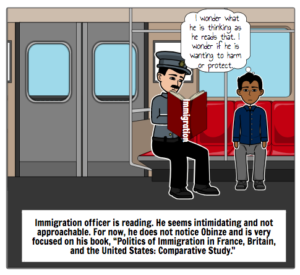
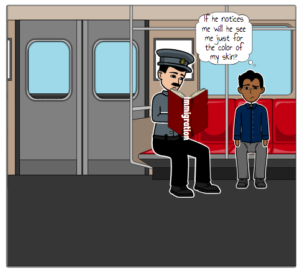
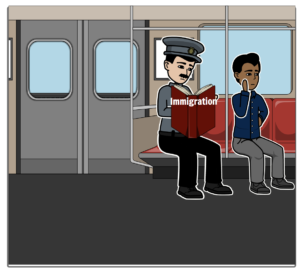
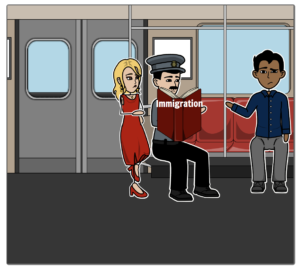
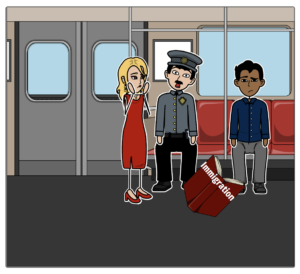
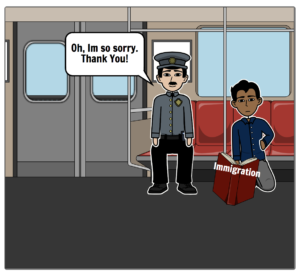
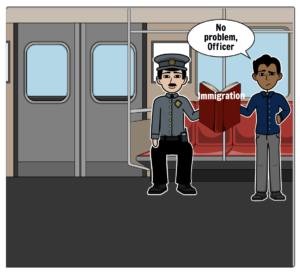
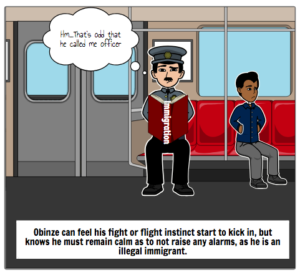
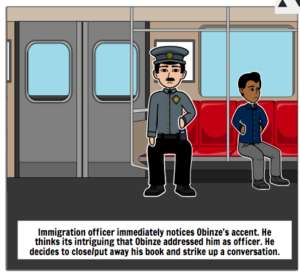
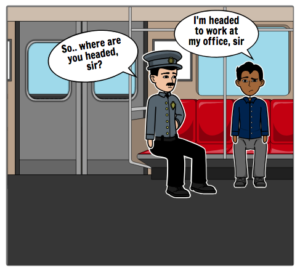
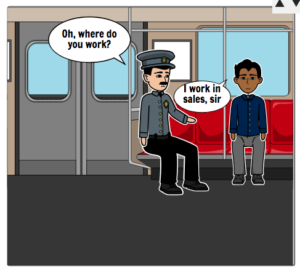
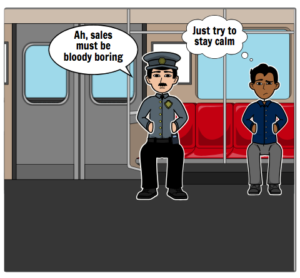
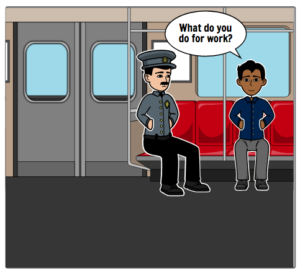
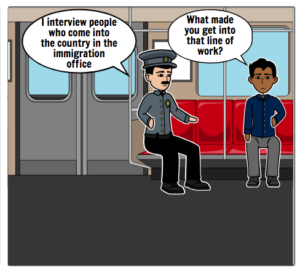
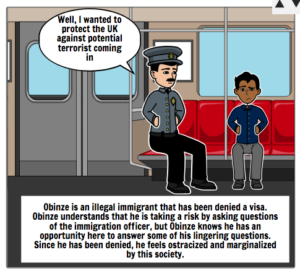
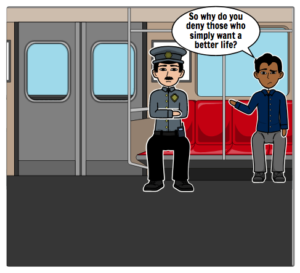
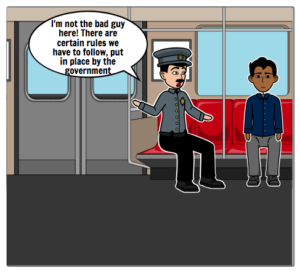
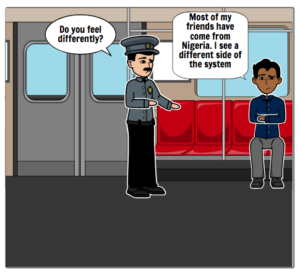
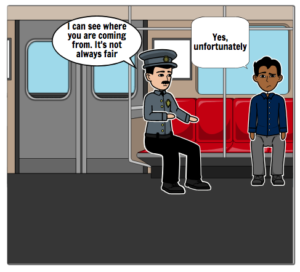
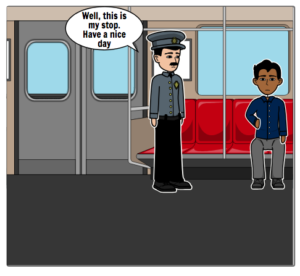
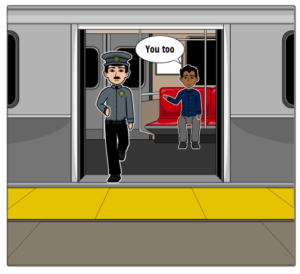
Proposal:
For our final assignment, Emma and I will be analyzing a scene that occurs in chapter 27 of Americanah. We decided that a comic strip would best to convey our message, as it could present a back-and-forth approach between characters. It will be able to show different viewpoints and can engage a multitude of audiences.
The inspiration for this scene comes from wanting to draw more attention to the social stigma that surrounds refugees, immigrants, and asylum seekers in the country that they are trying to relocate to. The anxiety they feel and the emotional trauma that they experience as they assimilate, as well as wanting to feel comfort that they are seen and heard in their new country, rather than just be invisible. Specifically, in chapter 27, Obinze reads only American newspapers and magazines, instead of British ones that were focusing on issues revolving around immigration. Later, Obinze encounters a woman on a train reading a newspaper about immigrants, which causes Obinze to feel lonely, as well as made him recognize that those who are natively from the United Kingdom can deny their hand in colonization. Our assignment will follow a similar path by showing the viewpoint of someone trying to obtain citizenship. It will also show the viewpoint of someone who was born in the United Kingdom and their career as an immigration officer. There will be dialogue between the two characters are they attempt to navigate this complex interaction. Different avenues will be explored, such as personal feelings, immigration laws in the country, social stigma, priviledge, and anxiety. A source we can use, although it is based on immigration in the United States and Mexico, is the academic journal, “Felons, not Families”: Criminalized illegality, stigma, and membership of deported “criminal aliens,” by Heidy Sarabia. This journal outlines U.S. immigration in the 1990s as they deported “criminal aliens,” and the affect this approach has had on effectively criminalizing these individuals which creates “consequences for their identity,” (Sarabia 284). While this source is not ideal, it goes in-depth on the issues that deportation and citizenship have on the identity of an individual, as well as their “reputation” that can develop due to the language used in the media to describe them.
Character List:
Obinze: A calm, intelligent young man, well-spoken illegal immigrant who works full time as a sales representative for the purpose of this script. This slightly imaginary scene takes place in Chapter 27. At this point in the novel, Obinze has been denied a visa and is currently an illegal immigrant. He is constantly on alert of those around him, as well as the current political climate and social stigma that surrounds those who are refugees, immigrants, and asylum seekers.
Immigration Officer: The immigration officer is taller and more built than Obinze, which adds to the intimidation and fear that Obinze feels during the interaction. He is white. He is in his work uniform and has a scowl on his face while reading his book on the train.
Women who accidentally bumps the immigration officer so he drops his book.
Script:
Characters are set away from each other on the train. The immigration officer is reading. Obinze notices and begins an internal dialogue.
Immigration officer is reading. He seems intimidating and not approachable. For now, he does not notice Obinze and is very focused on his book, “Politics of Immigration in France, Britain, and the United States: Comparative Study.”
Obinze’s thoughts: I wonder what he is thinking as he reads that. Did he get into this line of work to help or to harm?
Immigration Officer continues reading.
Obinze thoughts: If he notices me, will he see me for me or simply the color of my skin?
Immigration officer shifts in his seat slightly and causes Obinze to get nervous and look away quickly.
Immigration officer continues reading without noticing Obinze
The train stops and a woman rushes past, bumping the officer and causing him to drop his book.
Immigration officer drops book by Obinze’s feet and Obinze picks it up and hands it back.
Immigration officer: oh I’m sorry, thank you.
Obinze: Not a problem, officer.
Obinze can feel his fight or flight instinct start to kick in, but knows he must remain calm as to not raise any alarms, as he is an illegal immigrant.
Immigration officer immediately notices Obinze’s accent. He thinks its intriguing that Obinze addressed him as officer. He decides to close/put away his book and strike up a conversation.
Immigration officer: Where are you going?
Obinze: (insert fake location) I’m going to a work at my office.
Immigration officer: Oh, where do you work?
Obinze: in sales
Immigration officer: Ah, that must be bloody boring.
Obinze, still sensing danger, manages a slight smile.
Obinze: What do you do for work?
Immigration officer: I interview people coming into the country in the immigration office
Obinze: What made you get into that line of work?
Immigration officer: I mainly wanted to protect the UK against potential terrorists
Obinze is an illegal immigrant that has been denied a visa. Obinze understands that he is taking a risk by asking questions of the immigration officer, but Obinze knows he has an opportunity here to answer some of his lingering questions. Since he has been denied, he feels ostracized and marginalized by this society. Obinze believes that by asking questions of the officer, it may help him to gather further information and insight into his situation, as well as the viewpoint of the officer.
Obinze: So why do you deny those who are not terrorists and want a better life?
Immigration officer: This conversation just took a turn.
Immigration officer: I’m not the bad guy here. There are certain rules we have to follow, put in place by the government. That isn’t a part of the job I enjoy, but often, it has to be done.
Obinze: I suppose I understand that.
Immigration officer: Do you feel differently?
Obinze: I suppose I have a unique viewpoint since a lot of my friends have come from Nigeria, so I just see a different side of the system that often does not benefit those who are seeking a better life.
Immigration officer: I can see where you’re coming from, unfortunately it isn’t always fair.
Obinze gives a small smile
Obinze: Yes, unfortunately.
Immigration officer: Well, this is my stop. Have a nice day.
Obinze smiles and waves.
Obinze: You too.
Bibliography:
Adichie, Chimamanda Ngozi. Americanah. Alfred A. Knopf, 2016.
The novel, “Americanah,” follows Ifemelu and Obinze as they journey from Nigeria to the United States and England. Along the way, they fall in love and have the navigate their personal feelings, as well as their relationships with others while they are apart. Ifemelu travels to Philadelphia for college and struggles to feel as if she is at home and welcomed in the United States. Ifemelu begins to feel very depressed and no longer communicates with Obinze.
Obinze moves to England after he graduates, but is unable to find a job. His visa expires and he eventually becomes an illegal immigrant in England. He attempts to pay to be married to a girl in England in order to attain a green card, but is caught and sent back to England.
Ifemelu’s time in the United States is a rollercoaster of emotions. She begins to date Blaine and has a very popular blog about race. As a couple, they both start to support Obama’s presidency and stay in a relationship because of their support for him mostly. Ifemelu gets the opportunity to stay in the United States with a fellowship, but decides to end her relationship with Blaine and return to Nigeria.
In the meantime, Obinze is married to Kosi and they have a daughter. Obinze and Ifemelu finally decide to meet again and their past flame beings again, although since Obinze is married, they must end. Obinze then attempts to divorce Kosi, which she does not allow. Eventually, Obinze returns to Ifemelu.
B_TARGETjobs, Ross. “Immigration Officer: Job Description.” TARGETjobs, 23 Feb. 2017, targetjobs.co.uk/careers-advice/job-descriptions/279811-immigration-officer-job-description.
This media source overviews the duties of an immigration officer during their time of work. Some of these duties include, “observing passengers passing through passport control areas, examining passports, conducting interviews, taking fingerprints, carrying out surveillance, organising the removal of passengers who fail to qualify for entry, collecting statistics, and writing reports.” The article outlines different organizations that can employ immigration officers. The training and qualifications of immigration officers are also given, such as passing medical checks and security clearance. Other qualifications that are not required but provides advantages, include being fluent in multiple languages, or legal studies, superb A level or GCSE results. More strict qualifications for immigration officers in the UK are all candidates must be British Nationals, pass security checks, and medical checks. The article also states that, “all new recruits will receive an initial period of training that takes 9 weeks.”
Key skills for an immigration officer is also of utmost importance. The article states that “Immigration officers need to be assertive and have confidence in their own judgement while being fair and impartial. They need to be quick-thinking and observant to stop potential illegal immigrants. They have excellent communication and interpersonal skills as they regularly deal with international visitors with limited English language ability. They can be firm yet polite with people who may be frightened or aggressive. They are able to work independently as well as part of a team.” Immigration Officer’s versatile work ethic gives them a different look on how to handle each immigrant that comes through.
Blinder, Scott, and Lindsay Richards. “UK Public Opinion toward Immigration: Overall Attitudes and Level of Concern.” Migration Observatory, 7 June 2018, migrationobservatory.ox.ac.uk/resources/briefings/uk-public-opinion-toward-immigration-overall-attitudes-and-level-of-concern/.
This media source researched and provided an overview of the opinion that the United Kingdom citizens had towards immigrants and their level of concern. The discussion follows four core questions which are: “Do people favour or oppose immigration to the UK and is it seen as one of the most important issues facing the country? Secondly, are attitudes changing over time? Third, how does the UK compare to its European neighbours in its views? And Fourth, in light of the public debate around Brexit, how divided are we over attitudes to immigration?”
The source found that Britains do not look favorably at immigration, although there is evidence that attitudes are starting to change. Statistically, the data showed that 58% of Britain’s wanted to reduce the number of immigrants, while 30% are in favor of keeping the number where it currently is. In relation to attitude, there has been a shift in attitudes since 2013. Now, 45 percent agree that the number of immigrants is too high, compared to that opinion being 64 percent 4 years ago.
Britains do believe that immigration is the most important topic right now. When polls and surveys were taken, Britain’s showed a different preference of immigrants depending on their country of origin. The data showed that in 2017, 10 percent of Britain’s said that no Australians should be allowed in, while 37 percent stated that no Nigerians should be allowed.
The article did a great job at outlining the different data as it pertains to immigration, comparing it to other countries in Europe, and identifying the different factors for each set of data. It overviewed the opinions of the public, most of which Obinze would have interacted with on a daily basis. It helps to provide insight into the issue and the script.
Sarabia, Heidy. “Felons, Not Families”: Criminalized Illegality, Stigma, and Membership of Deported “criminal Aliens.” Migration Letters, vol. 15, no. 2, Apr. 2018, pp. 284–300. EBSCOhost, search.ebscohost.com/login.aspx?direct=true&db=a9h&AN=129478304&site=eds-live&scope=site.
While this source is between the United States and Mexico, it is beneficial for understanding the social stigma that surrounds illegal immigrants and how they are viewed by citizens and officers alike. The journal overviews the stigma that surrounds migrants who are deported and often labeled as “criminal aliens.” This label can often criminalize these migrants because of the system under which the United States operates. The journal further evaluates how this can have negative impacts on people’s identities if they are deported.
The journal states that “Consequently, the legal status of those unauthorized in the U.S. is so stigmatized that it has been called it an abject status, defined as “those in the lowest, most contemptible, and most wretched social status” (Gonzales and Chavez 2012:256).” This statement furthers the viewpoint of the journal on how illegal immigrants are seen and why the stigma surrounding them is so horrible.
This article was useful for research because it allows an insight into deportation and citizenship of an individual. It also allows insight into the damaging effects that deportation and the label “illegal alien” or “illegal immigrant” can have on immigrant’s identity. Through this source, Obinze’s thoughts during chapter 27 when he sees the woman reading the newspaper can be further understood by the reader. He feels ostracized and seen as a criminal or a threat to Britain’s way of life. He also feels like she views him in a negative light, regardless of Obinze’s intentions for living a productive life.
Turnbull, Sarah1. “Immigration Detention and the Racialized Governance of Illegality in the United Kingdom.” Social Justice, vol. 44, no. 1, Jan. 2017, pp. 142–164. EBSCOhost, search.ebscohost.com/login.aspx?direct=true&db=eue&AN=126568813&site=eds-live&scope=site.
This scholarly source outlines the suspected racism in Britain’s immigration system. This text overviewed how the british government handled immigrants, asylum seekers, and refugees. The text found that not only did the system produce a hostile environment, it also systematically spreads racism through the lack of diversity within the staff. The journal states, “the lack of racial diversity among staff was stark, with predominantly white “keepers” and non-white “kept.” The immigration officers were mostly white, while those they were in charge of handling were most often not, as it was described in this quote from the journal: “The telling point, however, was that whiteness was associated with authority and with an outsider status.”
The detention center often handles those who are poor and have a more difficult time living a “standard” life in the United Kingdom. It often inhibits their ability to “work, rent, bank, or obtain a driver’s license in the UK,” which often leads them to leave the country because they can not live a life there.
The article provided an example of an interaction between an officer and a detainee. The detainee was Brazilian and was making comments that British citizens are lazy. The officer got involved when hearing these claims and take offense to these comments. The officer then decided to immediately end the argument, rather than allowing it to lead to an important conversation. In this process, the officer further marginalized the detainee and their experiences. This article helps for insight into Obinze’s oppression that he experiences in London while trying to gain citizenship.